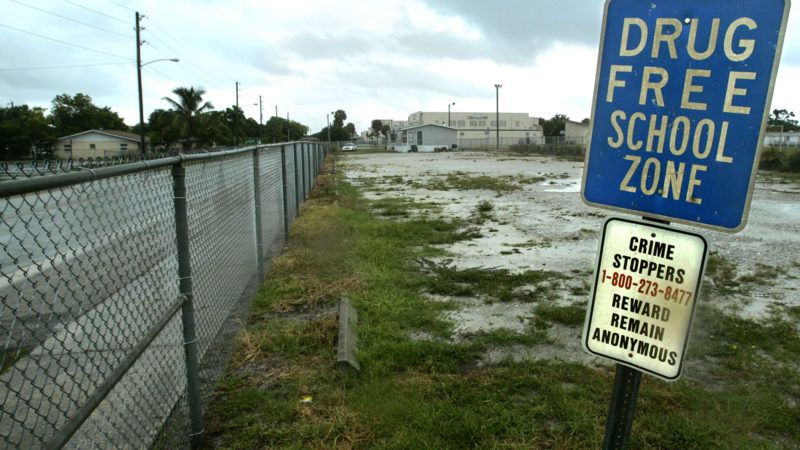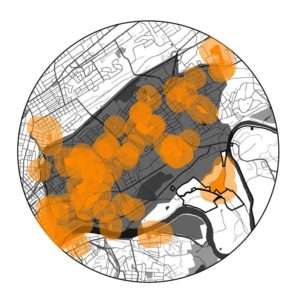Tennessee Passes Drug-Free School Zone Reforms Following Reason Investigation
The harsh laws covered large swaths of Tennessee's cities in enhanced sentencing zones and locked away minor drug offenders for years.

The Tennessee legislature passed a bill Wednesday night significantly reforming its harsh drug-free school zone laws, which were the subject of a 2017 Reason investigation.
The Tennessee House voted 88-4 to pass legislation shrinking the state's drug-free school zones from 1,000 feet to 500 feet. The bill, introduced by Republican state Rep. Michael Curcio, also requires a court to find that a defendant's conduct endangered children or other vulnerable people before mandatory minimum sentences can be applied. The Tennessee Senate unanimously passed the bill last week, and it now goes to Republican Gov. Bill Lee's desk for a signature.
All 50 states and the District of Columbia passed drug-free school zone laws during the 1980s and '90s with the goal of keeping drugs away from kids. However, Reason's investigation revealed that Tennessee's particularly harsh law created enhanced sentencing zones that covered large swaths of cities, extending 1,000 feet from every school, park, library, and daycare. Those zones turned minor drug crimes into mandatory minimum prison sentences that rivaled—and sometimes exceeded—those for second-degree murder and rape.
"While this was well-intentioned, unfortunately, this policy has not been accomplishing the outcome that the legislature intended," Curcio said during a committee hearing on the bill earlier this year. "The main reason for this failure is that drug offenders are not often affected by deterrence-based policies."
"It would also be my argument today that these zones cast far too wide a net in our communities," Curcio continued. "While 1,000 feet might not sound like a lot, over a quarter of the state's total land area within city limits are within a zone."

Reason's analysis of geographic data from the Tennessee government showed that 27 percent of Nashville and more than 38 percent of Memphis were covered by drug-free school zones. Those zones applied day and night, whether or not children were present, and in private residences or when one was simply driving through a zone.
"I'm really excited that the first major sentencing reform bill to pass the Tennessee legislature in decades is drug-free school zone reform," says Lauren Krisai, senior policy analyst at the U.S. Justice Action Network and co-author of Reason's investigation. "Once lawmakers saw how expansive these zones were and how pervasive they've been for so many communities, it was clear that reform was needed."
Civil liberties groups, and even some current and former prosecutors, say such drug-free school zone laws are rarely, if ever, used to prosecute drug cases involving minors. Instead, prosecutors use the threat of a drug-free school zone charge and accompanying mandatory minimum sentence to squeeze guilty pleas out of defendants who had no idea they were in a zone. (In a few cases, Reason found police intentionally set up drug deals inside school zones to secure enhanced charges.)
Take the case of Calvin Bryant, who was 20 years old when he was sentenced in 2008 to 17 years in Tennessee state prison—15 of them mandatory—for selling ecstasy to a confidential informant out of his Nashville apartment, which happened to be within 1,000 feet of a school.
If Bryant had been convicted of second-degree murder, he would have been eligible for an earlier release. That crime carries a minimum 15-year sentence but includes a possibility for release within 13.
After serving 10-and-a-half years in prison, Bryant was released in 2018 after prosecutors struck a deal to release him on time served. Bryant now mentors inner-city youth through a nonprofit organization he started.
Over the past decade, Utah, Indiana, and Massachusetts all passed laws reducing their drug-free school zone laws and associated criminal penalties in response to similar concerns.
Molly Gill, vice president of policy for the criminal justice advocacy group FAMM, says Tennessee's reforms are in some ways both less and more sweeping than other states.
"Utah's [drug-free school zone] is 100 feet from a school," she says. "On the other hand, though, this bill basically restores judicial discretion at sentencing for drug-free school zone offenses, and that's a much bigger step than many other places have been willing to take."
However, the Tennessee law, assuming the governor signs it, would not apply retroactively. Gill says there are currently around 400 inmates in Tennessee state prisons serving sentences for drug-free school zone offenses—a number that does not take into account defendants who pleaded guilty to lesser charges to avoid a school zone conviction.
"A lot of them don't need to be doing that much time and maybe don't need to be there at all anymore," Gill says. "We really hope that the governor will use his clemency power to review those 400 cases and let the people who deserve to go home, go home."


Show Comments (16)